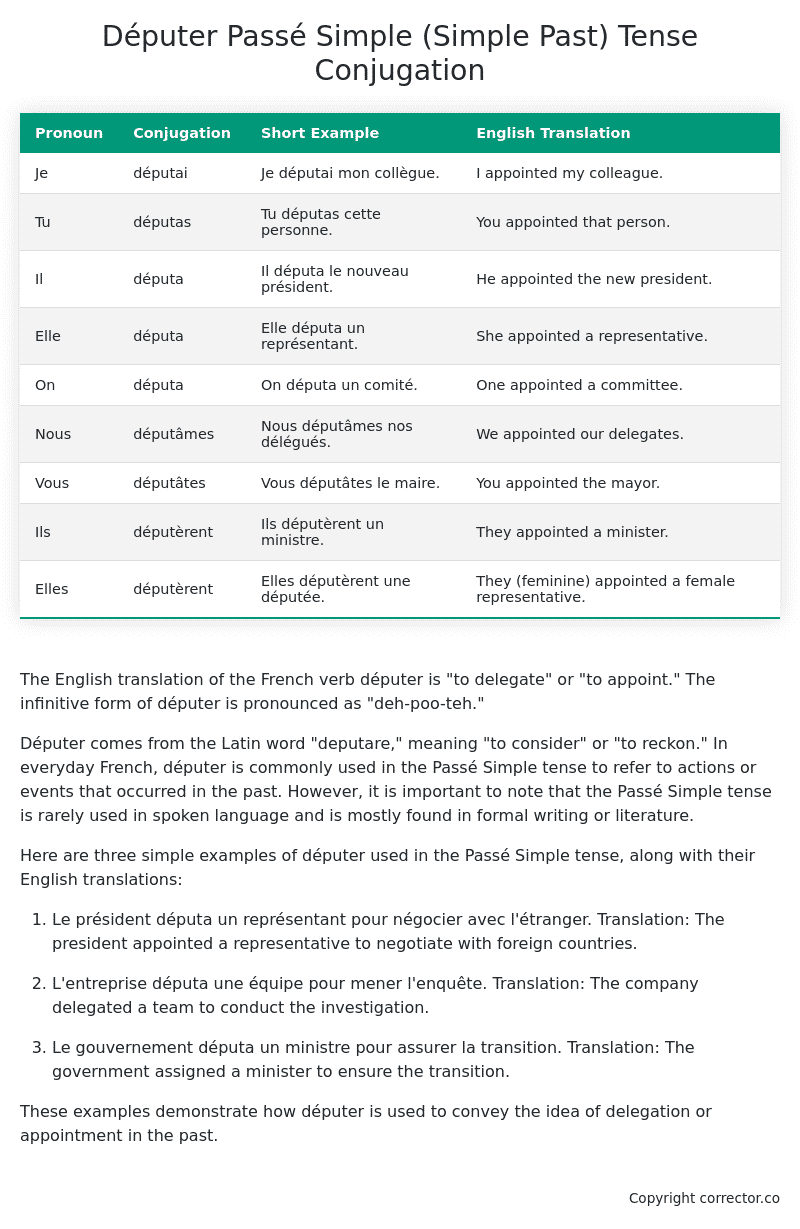Passé Simple (Simple Past) Tense Conjugation of the French Verb députer
Introduction to the verb députer
The English translation of the French verb députer is “to delegate” or “to appoint.” The infinitive form of députer is pronounced as “deh-poo-teh.”
Députer comes from the Latin word “deputare,” meaning “to consider” or “to reckon.” In everyday French, députer is commonly used in the Passé Simple tense to refer to actions or events that occurred in the past. However, it is important to note that the Passé Simple tense is rarely used in spoken language and is mostly found in formal writing or literature.
Here are three simple examples of députer used in the Passé Simple tense, along with their English translations:
-
Le président députa un représentant pour négocier avec l’étranger.
Translation: The president appointed a representative to negotiate with foreign countries. -
L’entreprise députa une équipe pour mener l’enquête.
Translation: The company delegated a team to conduct the investigation. -
Le gouvernement députa un ministre pour assurer la transition.
Translation: The government assigned a minister to ensure the transition.
These examples demonstrate how députer is used to convey the idea of delegation or appointment in the past.
Table of the Passé Simple (Simple Past) Tense Conjugation of députer
| Pronoun | Conjugation | Short Example | English Translation |
|---|---|---|---|
| Je | députai | Je députai mon collègue. | I appointed my colleague. |
| Tu | députas | Tu députas cette personne. | You appointed that person. |
| Il | députa | Il députa le nouveau président. | He appointed the new president. |
| Elle | députa | Elle députa un représentant. | She appointed a representative. |
| On | députa | On députa un comité. | One appointed a committee. |
| Nous | députâmes | Nous députâmes nos délégués. | We appointed our delegates. |
| Vous | députâtes | Vous députâtes le maire. | You appointed the mayor. |
| Ils | députèrent | Ils députèrent un ministre. | They appointed a minister. |
| Elles | députèrent | Elles députèrent une députée. | They (feminine) appointed a female representative. |
Other Conjugations for Députer.
Le Present (Present Tense) Conjugation of the French Verb députer
Imparfait (Imperfect) Tense Conjugation of the French Verb députer
Passé Simple (Simple Past) Tense Conjugation of the French Verb députer (You’re reading it right now!)
Passé Composé (Present Perfect) Tense Conjugation of the French Verb députer
Futur Simple (Simple Future) Tense Conjugation of the French Verb députer
Futur Proche (Near Future) Tense Conjugation of the French Verb députer
Plus-que-parfait (Pluperfect) Tense Conjugation of the French Verb députer
Passé Antérieur (Past Anterior) Tense Conjugation of the French Verb députer
Futur Antérieur (Future Anterior) Tense Conjugation of the French Verb députer
Subjonctif Présent (Subjunctive Present) Tense Conjugation of the French Verb députer
Subjonctif Passé (Subjunctive Past) Tense Conjugation of the French Verb députer
Subjonctif Imparfait (Subjunctive Imperfect) Tense Conjugation of the French Verb députer
Subjonctif Plus-que-parfait (Subjunctive Pluperfect) Tense Conjugation of the French Verb députer
Conditionnel Présent (Conditional Present) Tense Conjugation of the French Verb députer
Conditionnel Passé (Conditional Past) Tense Conjugation of the French Verb députer
Conditionnel Passé II (Conditional Past II) Tense Conjugation of the French Verb députer
L’impératif Présent (Imperative Present) Tense Conjugation of the French Verb députer
L’impératif Passé (Imperative Past) Tense Conjugation of the French Verb députer
L’infinitif Présent (Infinitive Present) Tense Conjugation of the French Verb députer
L’infinitif Passé (Infinitive Past) Tense Conjugation of the French Verb députer
Le Participe Présent (Present Participle) Tense Conjugation of the French Verb députer
Le Participe Passé (Past Participle) Tense Conjugation of the French Verb députer
Struggling with French verbs or the language in general? Why not use our free French Grammar Checker – no registration required!
Get a FREE Download Study Sheet of this Conjugation 🔥
Simply right click the image below, click “save image” and get your free reference for the députer Passé Simple tense conjugation!

Députer – About the French Passé Simple (Simple Past) Tense
Formation
Usage
Narration
Historical Context
Interactions with other tenses
Passé Composé
Imparfait
Conditional and Subjunctive
Summary
I hope you enjoyed this article on the verb députer. Still in a learning mood? Check out another TOTALLY random French verb conjugation!


